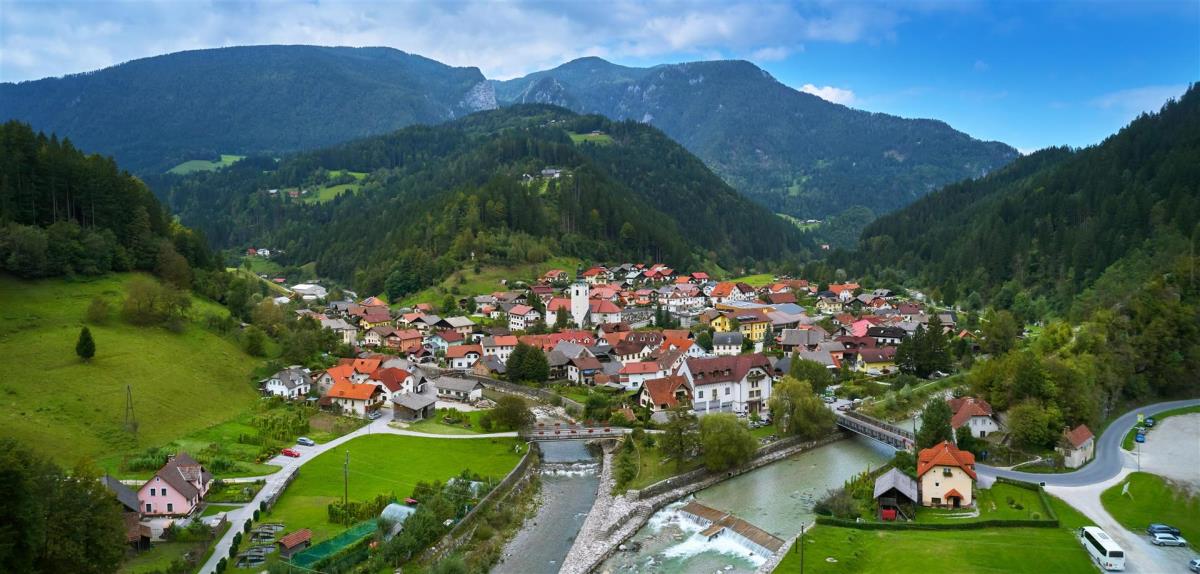26.02.2020
Luče paving the way – The first Slovenian energy community
The first Slovenian energy community is emerging in the village of Luče, the centre of the Luče municipality in the picturesque Upper Savinja Valley. By introducing innovative technical solutions on the electricity grid, integrating renewable energy sources and testing systemic changes, the Compile project team are establishing a pilot example of integrating local and self-sufficient energy communities into the electricity grid. The project is funded by the European Union Horizon 2020 programme and coordinated by the Laboratory of Energy Policy (Faculty of Electrical Engineering, University of Ljubljana). With five pilot sites in Europe, the project brings together research organizations, system operators, energy companies and users into the partnership.
On Thursday, 20 February 2020, the Municipality of Luče hosted a workshop, organised as part of the Compile project activities. In addition to the project coordinator, the workshop was attended by the Luče Mayor, Mr Ciril Rosc, a representative of the local community, representatives of the companies Petrol and Elektro Celje, and IRI UL, which participates in the project as a third-linked party. The main objective of the project is to show the opportunities of energy islands for decarbonisation of energy supply, community building and creating environmental and socioeconomic benefits. COMPILE project aims to activate and use local energy systems in order to support the fast growth of energy production from renewable energy sources (RES) in constrained networks and foster the transition from centralized system with passive users into a flexible network of active users featuring energy communities. Self-sufficient energy communities based on renewable energy sources are one of the important strategies that have positive environmental and social impacts that can increase self-sufficiency, reliability and security of electricity supply.
So far, nine solar power plants in residential houses, in-house batteries and a larger system battery have been successfully installed and connected in Luče. The project also plans to install public and in-house electric charging stations. A unique challenge presented by the introduction of this pilot self-sufficient energy community is its integration into the existing network and adapting legislation to new forms of active users, so-called prosumers, who are no longer merely consumers of electricity.
In addition to the technical solutions that enable the creation of energy islands, the social – community – part of energy communities also plays an important role. How to organize energy communities, what are the good practices of integration measures, and how it can have a positive impact on the wider local community are just some of the issues that will encourage the introduction of such communities in the future. As Luče is one of the examples of good European practices and the pioneering emerging community in Slovenia, they will also play an important role in the NGR2peers project, which was recently approved for funding within the Horizon 2020 programme. IRI UL researcher, Dr Sara Arko who took part in the workshop in Luče, outlined the key aims and goals of the project, in which IRI UL is a partner organization. The project will foster the emergence of a new generation of energy communities through an inherently interdisciplinary approach that introduces anthropological research methods into the process of technological solutions development. Among the nine demonstration sites, Luče will be the baseline ethnographic example, which will guide further research and innovation activities of the project.
Such pilot activities in the field of innovative energy solutions and adaptation of energy systems are an important step towards decarbonisation of the society, as well as reliability and security of electricity supply. Close cooperation between all key stakeholders and support by the local communities will be crucial for a successful creation and impact of future energy communities.
